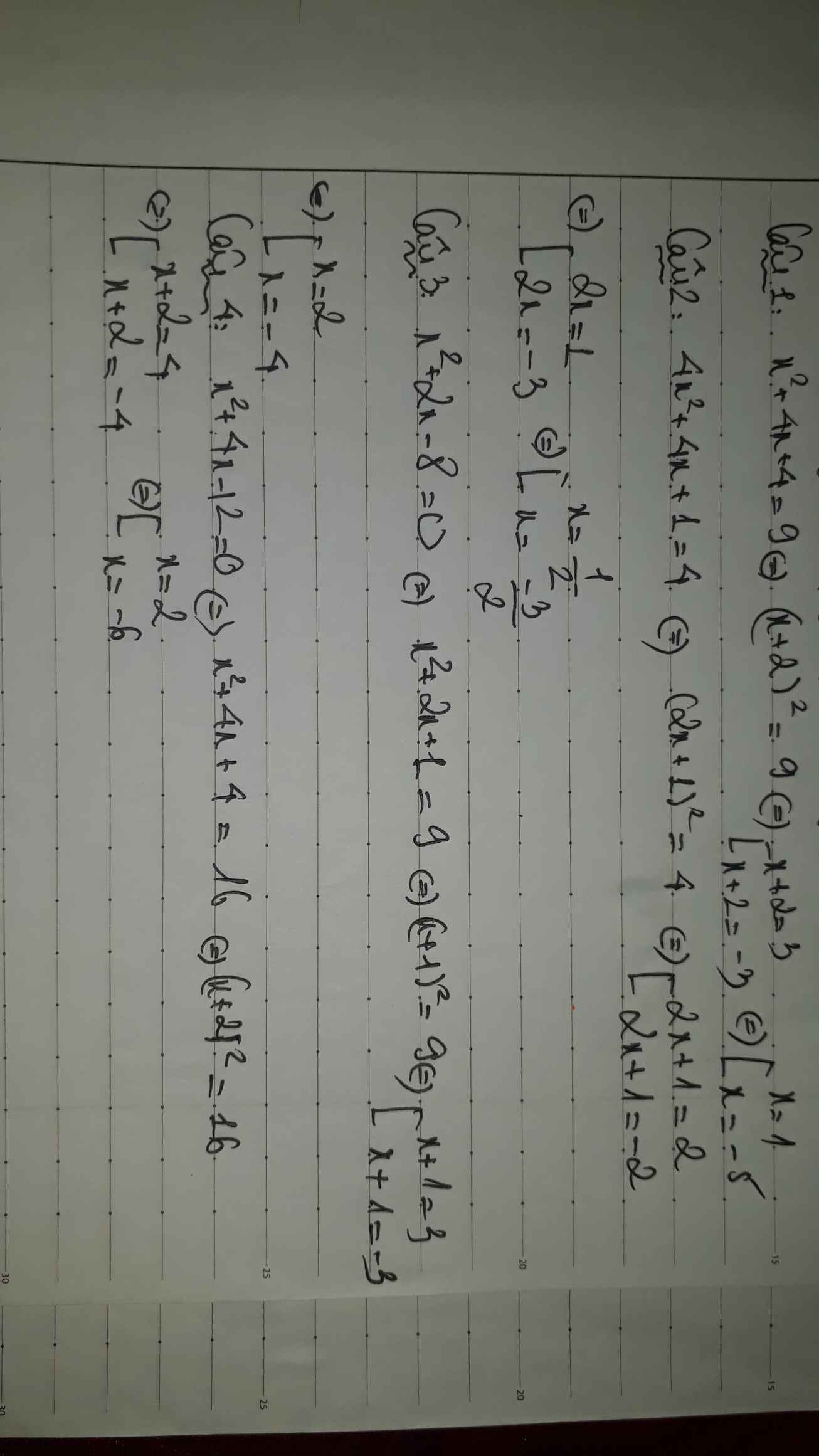x2 =4x +3 =0
Tuyển Cộng tác viên Hoc24 nhiệm kì 28 tại đây: https://forms.gle/GrfwFgzveoKLVv3p6

Những câu hỏi liên quan
1) (3x - 2)(4x + 5) = 0
2) (4x + 2)(x2 + 3) = 0
3) (2x + 7)(x - 3)(5x - 1) = 0
4) x2 - 3x = 0
5) x2 - x = 0
1
(3x-2)(4x+5)=0
⇔ 3x-2=0 -> x= 2/3
⇔ 4x-5=0 x= 5/4
Vậy tập nghiệm S = { 2/3; 5/4}
Đúng 1
Bình luận (0)
2, (4x+2)(\(X^2\)+3)=0
⇔ 4x+2=0 -> x= -1/2
\(x^2\)+3=0 -> x= \(\sqrt{3}\); -\(\sqrt{3}\)
Vaayj tập nghiệm S= { -1/2; \(\sqrt{3}\);-\(\sqrt{3}\)}
Đúng 1
Bình luận (0)
3)
(2x+7)(x-3)(5x-1)=0
⇔ 2x+7=0 -> x= -7/2
x-3 =0 -> x = 3
5x-1 =0 -> x= 1/5
Vậy tập nghiệm S={ -7/2; 3; 1/5}
Đúng 1
Bình luận (0)
Xem thêm câu trả lời
Giải phương trình bậc hai
A. X2 - 4x + 3 = 0
B. X2 - 4 = 0
C. X2 + 4x = 0
a) x2-4x+3=0
có Δ' = b'2-ac= 4-3=1 >0
nên phương trình có 2 nghiệm phân biệt: x1= 3; x2= 1
b) x2 -4=0
⇔ x2=4
⇔\(\left[{}\begin{matrix}x=-2\\x=2\end{matrix}\right.\)
c)x2+4x=0
⇔x (x+4)=0
⇔\(\left[{}\begin{matrix}x=0\\x+4=0\end{matrix}\right.\)
\(\left[{}\begin{matrix}x=0\\x=-4\end{matrix}\right.\)
Đúng 0
Bình luận (0)
Tim x, biết:
Câu 1. x2 + 4x + 4 = 9
Câu 2. 4x2 + 4x + 1 = 4
Câu 3. x2 + 2x - 8 =0
Câu 4. x2 + 4x - 12 = 0
\(\sqrt{4x-3}\) - \(\sqrt{x2-3}\)
= 0
Em ra là 4x - x2 = 0, tới đây làm sao nữa ạ?
`\sqrt{4x-3}-\sqrt{x^2-3}=0` `ĐK: x >= \sqrt{3}`
`<=>\sqrt{4x-3}=\sqrt{x^2-3}`
`<=>4x-3=x^2-3`
`<=>x^2-4x=0`
`<=>x(x-4)=0`
`<=>[(x=0(ko t//m)),(x=4(t//m)):}`
Vậy `S={4}`.
Đúng 2
Bình luận (1)
a, x2 - 4x = 0 b, (2x + 1)2 - 4x (x + 3) = 9
c, x2 -12x = -36
\(x\left(x-4\right)=0\Leftrightarrow\left[{}\begin{matrix}x=0\\x-4=0\end{matrix}\right.\Leftrightarrow\left[{}\begin{matrix}x=0\\x=4\end{matrix}\right.\)
\(4x^2+4x+1-4x^2-12x-9=0\)
\(-8x-8=0\Leftrightarrow x=-1\)
\(\left(x-6\right)^2=0\)
\(x-6=0\Leftrightarrow x=6\)
Đúng 0
Bình luận (0)
c)\(x^2-12x=-36\)
\(x^2-12x+36=0\)
\(\left(x-6\right)^2=0\)
\(\Rightarrow x-6=0\)
........
Đúng 0
Bình luận (0)
a) x2 + 4x = -3 b)3x2 + 4x – 4 = 0 c)x2 +5x - 6 = 0 d)x2 – 6x = -9
mọi người giải giúp em ạ
\(a,x^2+4x=-3\Leftrightarrow x^2+4x+3=0\Leftrightarrow\left(x+1\right)\left(x+3\right)=0\)
\(\left[{}\begin{matrix}x=-1\\x=-3\end{matrix}\right.\)
\(b,3x^2+4x-4=0\Leftrightarrow3x^2+6x-2x-4=0\Leftrightarrow3x\left(x+2\right)-2\left(x+2\right)=0\Leftrightarrow\left(3x-2\right)\left(x+2\right)=0\)
\(\left[{}\begin{matrix}x=-2\\3x=2\end{matrix}\right.\)
\(\left[{}\begin{matrix}x=-2\\x=\frac{2}{3}\end{matrix}\right.\)
\(c,x^2+5x-6=0\Leftrightarrow\left(x-1\right)\left(x+6\right)=0\)
\(\left[{}\begin{matrix}x=1\\x=-6\end{matrix}\right.\)
\(d,x^2-6x=-9\Leftrightarrow x^2+6x+9=0\Leftrightarrow\left(x-3\right)^2=0\Leftrightarrow x-3=0\Leftrightarrow x=3\)
Chứng minh rằng
a) – x2 + 4x – 5 < 0 với mọi x
b) x4 + 3x2 + 3 > 0 với mọi x
c) (x2 + 2x + 3)(x2 + 2x + 4) + 3 > 0 với mọi x
a: Ta có: \(-x^2+4x-5\)
\(=-\left(x^2-4x+5\right)\)
\(=-\left(x^2-4x+4+1\right)\)
\(=-\left(x-2\right)^2-1< 0\forall x\)
Đúng 0
Bình luận (1)
b: Ta có: \(x^4\ge0\forall x\)
\(3x^2\ge0\forall x\)
Do đó: \(x^4+3x^2\ge0\forall x\)
\(\Leftrightarrow x^4+3x^2+3>0\forall x\)
c: Ta có: \(\left(x^2+2x+3\right)=\left(x+1\right)^2+2>0\forall x\)
\(x^2+2x+4=\left(x+1\right)^2+3>0\forall x\)
Do đó: \(\left(x^2+2x+3\right)\left(x^2+2x+4\right)>0\forall x\)
\(\Leftrightarrow\left(x^2+2x+3\right)\left(x^2+2x+4\right)+3>0\forall x\)
Đúng 1
Bình luận (0)
Chứng minh rằng
a) – x2 + 4x – 5 < 0 với mọi x
b) x4 + 3x2 + 3 > 0 với mọi x
c) (x2 + 2x + 3)(x2 + 2x + 4) + 3 > 0 với mọi x
b: Ta có: \(x^4\ge0\forall x\)
\(3x^2\ge0\forall x\)
Do đó: \(x^4+3x^2\ge0\forall x\)
\(\Leftrightarrow x^4+3x^2+3>0\forall x\)
c: Ta có: \(\left(x^2+2x+3\right)=\left(x+1\right)^2+2>0\forall x\)
\(x^2+2x+4=\left(x+1\right)^2+3>0\forall x\)
Do đó: \(\left(x^2+2x+3\right)\left(x^2+2x+4\right)>0\forall x\)
\(\Leftrightarrow\left(x^2+2x+3\right)\left(x^2+2x+4\right)+3>0\forall x\)
Đúng 1
Bình luận (0)
Giải các phương trình sau:
g/ x(x + 3)(x – 3) – (x + 2)(x2 – 2x + 4) = 0
h/ (3x – 1)(x2 + 2) = (3x – 1)(7x – 10)
i/ (x + 2)(3 – 4x) = x2 + 4x + 4
k/ x(2x – 7) – 4x + 14 = 0
m/ x2 + 6x – 16 = 0
n/ 2x2 + 5x – 3 = 0
\(m,x^2+6x-16=0\)
\(\Leftrightarrow x^2-2x+8x-16=0\)
\(\Leftrightarrow x\left(x-2\right)+8\left(x-2\right)=0\)
\(\Leftrightarrow\left(x+8\right)\left(x-2\right)=0\)
\(\Leftrightarrow\left[{}\begin{matrix}x+8=0\\x-2=0\end{matrix}\right.\)
\(\Leftrightarrow\left[{}\begin{matrix}x=-8\\x=2\end{matrix}\right.\)
\(n,2x^2+5x-3=0\)
\(\Leftrightarrow2x^2-x+6x-3=0\)
\(\Leftrightarrow x\left(2x-1\right)+3\left(2x-1\right)=0\)
\(\Leftrightarrow\left(x+3\right)\left(2x-1\right)=0\)
\(\Leftrightarrow\left[{}\begin{matrix}x+3=0\\2x-1=0\end{matrix}\right.\)
\(\Leftrightarrow\left[{}\begin{matrix}x=-3\\x=\dfrac{1}{2}\end{matrix}\right.\)
Đúng 2
Bình luận (0)
\(k,x\left(2x-7\right)-4x+14=0\)
\(\Leftrightarrow2x^2-4x-7x+14=0\)
\(\Leftrightarrow2x\left(x-2\right)-7\left(x-2\right)=0\)
\(\Leftrightarrow\left(2x-7\right)\left(x-2\right)=0\)
\(\Leftrightarrow\left[{}\begin{matrix}2x-7=0\\x-2=0\end{matrix}\right.\)
\(\Leftrightarrow\left[{}\begin{matrix}x=\dfrac{7}{2}\\x=2\end{matrix}\right.\)
Đúng 2
Bình luận (1)
Xem thêm câu trả lời
tìm m để phương trình x2\(^{ }\)-4x+m-1=0 có hai nghiệm x1,x2 thỏa mãn x1^3+x2^3-40=0
Theo VI-ét:\(\left\{{}\begin{matrix}x_1+x_2=4\\x_1x_2=m-1\end{matrix}\right.\)
\(x^3_1+x^3_2-40=0\\ \Rightarrow\left(x_1+x_2\right)\left(x^2_1-x_1x_2+x^2_2\right)=0\\\Rightarrow4\left[\left(x^2_1+x_2^2\right)^2-3x_1x_2\right]-40=0\\ \Rightarrow\left(x^2_1+x_2^2\right)^2-3x_1x_2-10=0\\ \Rightarrow4^2-3\left(m-1\right)-10=0\\ \Rightarrow16-3m+3-10=0\\ \Rightarrow9-3m=0\\ \Rightarrow m=3\)
Đúng 3
Bình luận (1)


















![𒅒[̲̅t̲̅]â[̲̅y̲̅]♜[̲̅d̲̅]...](https://hoc24.vn/images/avt/avt6104997_256by256.jpg)












